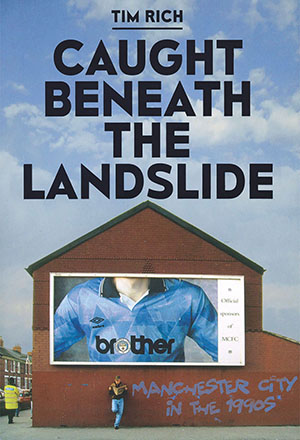
DeCoubertin Books, £18.99
Reviewed by Tony Curran
From WSC 383, February 2019
Buy the book
In the same way that political commentators thrive during governmental mayhem, those documenting the history of a football club tend to be at their most engaging in a time of protracted in-fighting, decline and ultimate implosion.
By focusing on Manchester City in the 1990s, Tim Rich has, in this respect, mined a particularly rich seam. A retrospective peek behind the scenes at a club in a time of such disarray will inevitably be more entertaining than examining the harmony of a well-oiled winning machine. Victors may have trophies, but losers have the best stories.
In late 1989 the well-respected Howard Kendall was appointed by City chairman Peter Swales as the manager destined to make the club title contenders. However he lasted less than a year at Maine Road before being whisked back to Everton – his departure seemingly hastened by regular clashes with a Manchester Evening News football reporter – leaving as his legacy an attitude of tactical flexibility but also an ingrained drinking culture, stories of which even seem to exceed the popular rumour of the time.
Kendall’s right-hand man Peter Reid stepped up and his three seasons in the hot seat are recorded here in almost heroic terms as he battles to adopt a pragmatic approach – he twice broke City’s transfer record in recruiting Wimbledon defenders – which saw a run of impressive top-flight finishes before he was publicly undermined by Swales. Without consultation, the chairman brought in a football journalist as a general manager with a remit to “hire and fire”. Soon, Reid was gone, and then came the landslide.
The left-field managerial appointment of Brian Horton brought some short-lived excitement and Steve Coppell’s 33 days as manager remain a source of intrigue, but the rest of the decade offers little but tales of gloom. Alan Ball has been heavily criticised as the architect of the club’s decline in this era in being responsible for taking them down from the Premier League, but Rich gives him a more favourable hearing. Ball is presented as an honest trier and ultimately a victim of City’s financial meltdown, not least because he was instructed to sell his impressive young captain Garry Flitcroft during the relegation battle to pacify the club’s bankers. Frank Clark’s unhappy tenure is also gauged in the context of the chaos that he inherited, where he pined for boardroom support (“the best set-up in football is when you get a benevolent dictator”) but found that then chairman Francis Lee “was not even the main shareholder”.
The author displays impressive levels of research throughout with many anecdotes, including private conversations and phone calls, quoted verbatim rather than paraphrased, displaying an admirable trust in both the credibility and recall of his sources. It adds to the integrity of a fascinating and insightful book that ought to be enjoyed far beyond Manchester City’s fanbase.